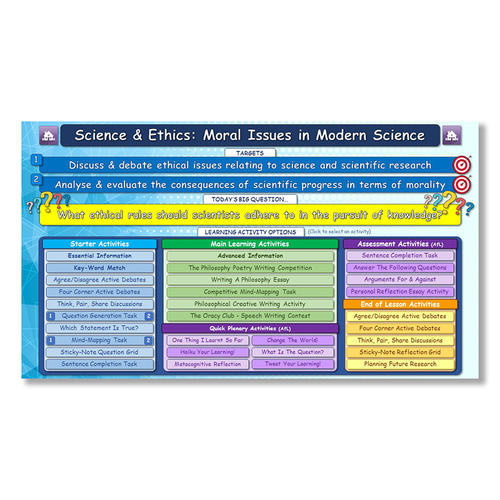


















Explore ethical issues relating to scientific research and advancement with this philosophy teaching resource for students aged 8-16!
This multi-use interactive philosophy lesson is ideal for teachers who want to explore ethical issues relating to science with students aged 8-16; we’ve carefully selected the most significant moral issues and questions relating to philosophy of science so that young learners can engage in interesting philosophical discussions and engaging moral debates. This session explores topics such as:
- The nature of ethical vs unethical scientific research
- The ethical duties of scientists
- Rules that ensure scientific research is ethical
- The use of animals in scientific research
- Moral issues raised by new scientific advancements (e.g., nuclear weapons, genetic engineering, and artificial intelligence)
One of the overarching issues explored in this session is the degree to which scientists are responsible for the ways in which their research is used and the technologies that research can give rise to.
The big question asked in this session is “What ethical rules should scientists adhere to in the pursuit of knowledge?”. Using a variety of engaging activities students will discuss and debate a wide range of other philosophical questions such as:
- What kinds of ethical considerations should all scientists keep in mind when conducting research?
- What ethical rules should all scientists stick to when conducting research?
- Are there some things that are fundamentally unethical to research in the first place?
- To what extent is it ethical for a scientist to help develop new drone weaponry?
Students will also analyse and evaluate an eclectic mix of philosophical and moral claims such as:
- “Sometimes it’s okay to use animals in scientific experiments”
- “It’s always okay to experiment on humans if they give consent”
- “Some scientific advancements have done more harm than good”
- “Scientists should have refused to help develop nuclear weapons” and
- “Sometimes it’s okay for scientists to distort data if it leads to a greater good”
Something went wrong, please try again later.
This resource hasn't been reviewed yet
To ensure quality for our reviews, only customers who have purchased this resource can review it
Report this resourceto let us know if it violates our terms and conditions.
Our customer service team will review your report and will be in touch.